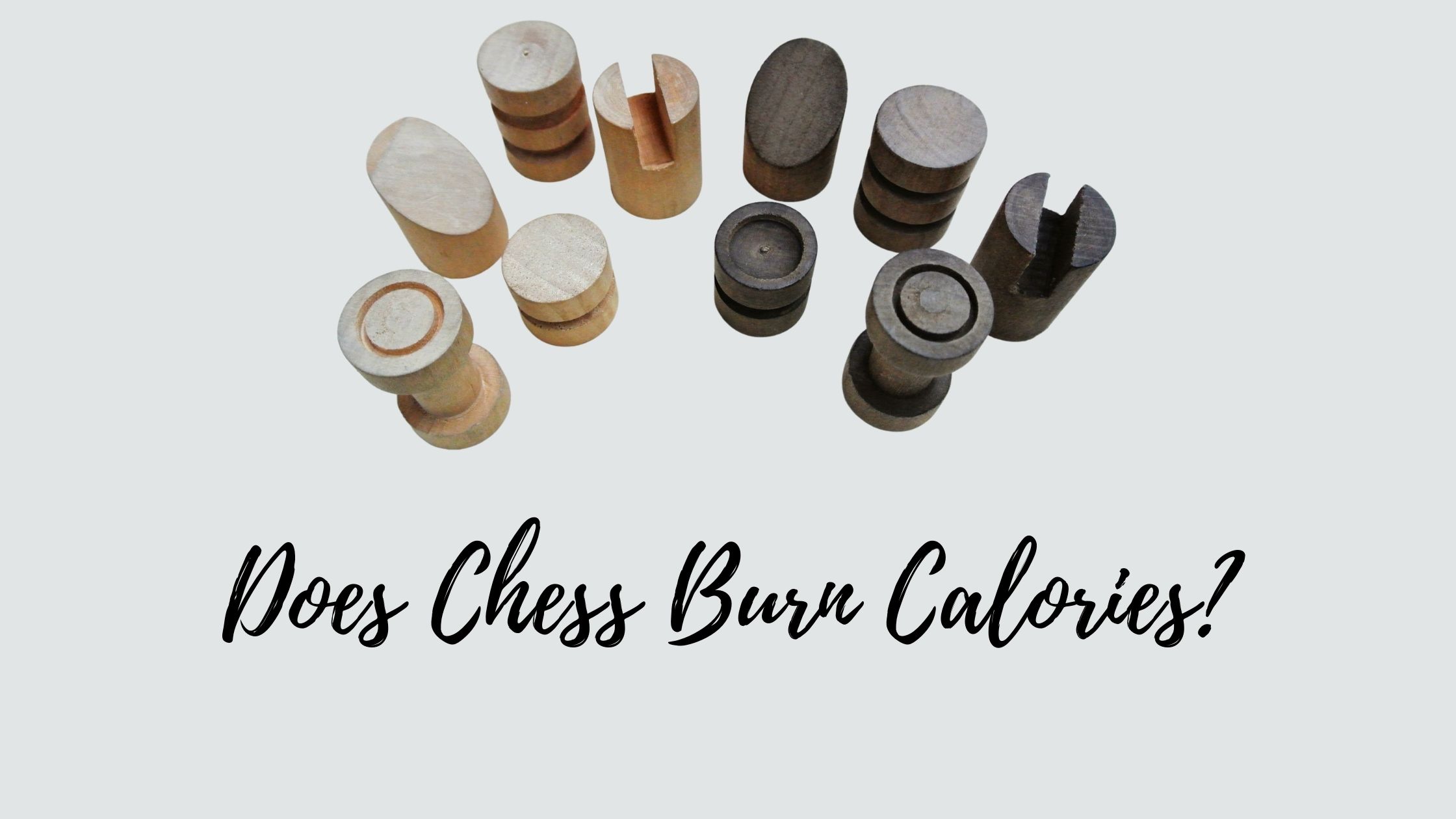30 Aug Does Chess Burn Calories?

It’s hard to believe that a game of chess where the players use only their brains and maybe some arm movements is exceptionally physically demanding. In 1984, the World Chess Championship was called off after a run of over 5 months and 48 games.
The reason?
Anatoly Karpov, the defending champion, had lost over 22 pounds!
His deathly pallor was an indication of the toll the game of chess and the pressure of participating in an elite competition was putting on him. Karpov is not an exception. The year 2004 saw winner Rustam Kasimdzhanov walked away from the world championship. He noticed that he had lost just about 17 pounds.
The 1984 World Championship between Garry Kasparov and Anatoly Karpov. Karpov had cemented his position as the world’s best player and world champion when Garry Kasparov arrived on the scene. In their first match in 1984, Karpov quickly built a 4-0 lead and needed two more wins to keep his title. Instead, the masters drew the next 16 games, and it took Karpov until Game 27 to finally win a game.
In Game 31, Karpov had a winning position but failed to take advantage and settled for a draw. He lost the next game but drew the next 14. In particular, Karpov held a solidly winning position in Game 41 but again blundered terribly and had to settle for a draw. After Kasparov suddenly won Game 47 and 48, Karpov suffered a mental and physical breakdown, having lost 22 pounds over the course of the match.
The FIDE President controversially terminated the match, which had lasted an unprecedented four months with five wins for Karpov, three for Kasparov, and a staggering forty draws. A rematch was set for the following year. In a hard fight, featuring an incredible blunder by Karpov in the final game, Karpov lost his title 11 to 13 in the 1985 match, ending his ten-year reign as champion.
It’s not just the stress of playing against formidable opponents that makes chess players lose weight. Research has proven that the grandmasters’ stress responses to chess are almost similar to what elite athletes experience.
Brain Power and Energy Consumption of Your Brain
According to a report published in Scientific American, the human brain uses up to 20% of the body’s total energy consumption. This is more than any other human organ. It also might lead you to believe that all this energy is consumed to fuel the electrical impulses that neurons employ to communicate with each other.
What’s more, the research discusses two more studies – one from the National Academy of Sciences USA that says that only 2/3rd of our brain’s energy budget helps neurons send signals. The rest is used for cell health maintenance. This 1/3rd portion helps keep brain tissue alive and other biological functions of the brain, equally crucial as neuronal chats.
Have you ever studied for an exam and felt drained, not just mentally but also physically? That’s your brain in overdrive and drawing energy to keep itself going.
Chess and the Brain Drain
Even with almost no physical activity for hours, players tend to lose weight due to stress, poor eating, sleeping habits, bad posture, and more, leading them to burn more calories than they consume or what’s needed. You can keep debating whether chess is a sport or not, but the fact that it puts great physical fitness demands on chess players, especially when played at the highest levels, can’t be ignored.
Of course, you may not feel the difference when playing regular chess. Still, for long tournaments, hours of preparation, and burning the midnight oil, the bodies need the endurance to last for several hours. That sustenance is similar to what you need for manual labor, even running a marathon, in some cases.
Understanding Calories
In simple terms, calories are simply a unit of energy that our body gets from eating. Our bodies need the energy to perform our daily activities, which also include using our brain. According to the Harvard Mahoney Neuroscience Institute, our brain relies heavily on glucose, a form of sugar, for basic activities like thinking, learning, and memory. In any case, brain activities are part of our physiological functions, and like any other organ, the brain consumes its fair share of energy.
Does Chess Burn Calories?
Amateur and casual gaming aside, professional chess that lasts for extended periods like in classical chess games with long time controls that tend to last 6 hours or more frequently, sometimes multiple days, chess needs more than just brainpower. Some physical activity is needed to ensure the players get back at it with the same alertness and mental strength level. Even in the more popular rapid/blitz tournaments, players sometimes schedule multiple games each day, making the deal a full day of work for the players.
Even though the games are shorter, they are more fast-paced, and players’ mental strength gets a very timely and essential boost with their physical strength. The massive burning of calories is not just due to more brain activity. It is also due to physiological factors, especially stress, that needs to be managed with a routine that includes physical activity that helps the mind relax.
To say that chess puts great physical demands on players won’t be wrong. However, chess does push players like World Champion Max Euwe, who prepared for his chessboard bouts against Alekhine from 1935 to 1937 by stepping into the boxing ring!
Chess players can claim that the fear, fight, and flight responses they experience while playing chess are similar to any other stressful situations they encounter in their lives. We burn calories all the time. Even when we are sleeping.
Therefore, the calories burnt while playing chess are enough to forget the treadmill and move on the chessboard instead of getting up and moving in real life is pushing things a bit too far.
You certainly aren’t burning many calories reading this blog!
How Many Calories Could You Burn While Playing Chess?
Research suggests that a chess player could burn up to 132 calories per hour, and for a 9-hour haul, it could be around 1188 calories consumed while playing chess. Burning calories while playing chess is as possible as doing any other sedentary activity like working on your laptop or playing any other board game. During a tournament, you would hardly see a chess player sweating, huffing, and puffing to know if their bodies are heated enough to burn the extra calories.
An average chess player consumes as much energy by playing chess for one hour as doing any other less strenuous activity. The weight loss and other related telltale signs appear only for certain players who cannot maintain a healthy routine and let stress get the better of them. So you can’t forget the treadmill and use chess as an excuse to burn sufficient calories.
A grandmaster like Mikhail Antipov could burn nearly 600 calories over a 2-hour game in 2018. This burn was equivalent to a 5-mile run. The calorific burn comes from increased heart and breathing rate and elevated blood pressure, which could add to weight loss. You do burn calories more regularly and at a pace that your body might show some signs of weight loss during a tournament, but if you eat well, you will get it all back in no time.
So there may be claims that elite players burn up to 6000 calories and lose up to 2 pounds a day during tournaments. The truth is chess can not be your ideal calorie burner if you are looking for some serious weight loss! Grandmaster chess is undoubtedly not for everybody!
How Chess Leads to Burning Calories
The stress: A stressful game like chess keeps your heart and breathing rates fired up, and your blood pressure could also be in the upper range. All this means that chess will take up some or more of your calorie intake if you continue playing for longer durations. The more mentally taxing a task is, the more energy our brain draws to complete it.
But thinking or intense concentration can’t substitute for physical activity, even if it burns similar energy. And therefore, it is not an effective weight-loss strategy either. You might run into a dip in your glucose level and feel distracted or tired after a long chess game, which may affect your cognitive performance.
Therefore, the goal should be to balance chess with physical activity and not just rely on numbers for calorie burn and weight loss!





